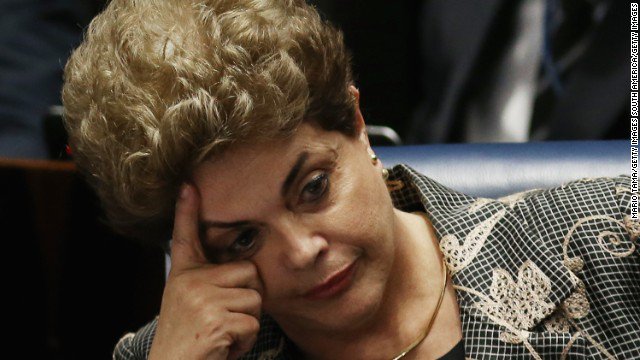
BRASILIA – Brazil’s Senate ousted Dilma Rousseff as president Wednesday, voting overwhelmingly to impeach the leftist leader in the culmination of a protracted process that has divided the country.
The vote to impeach Rousseff was 61 to 20. Two-thirds of senators – 54 out of 81 – were needed for impeachment to pass.
Senators broke into cheering and applause after the electronic voting was announced, concluding a process that was given the go-ahead in December.
The long-awaited Senate proceedings dragged on a bit longer than expected Wednesday as senators and Chief Justice Ricardo Lewandowski, who was presiding, debated points of order.
Emotions ran high as senators for and against Rousseff’s removal made emotional speeches.
“Scoundrels!” roared Lindbergh Farias, from her left-wing Workers’ Party. Conservative Sen. Ronaldo Caiado retorted that the Workers’ Party was the real scandal for bringing Brazil to a “critical political and social moment.”
Rousseff was suspended in May after the Senate confirmed a lower-house vote to send her to trial on charges that she broke budget laws. Her former vice president, Michel Temer, took over as interim president.
Temer now is scheduled to be confirmed as president in a Wednesday afternoon ceremony for the rest of Rousseff’s term, which ends in December 2018. In the evening, he plans to fly to China to take part in a summit of the Group of 20 major economies.
Rousseff declared her innocence. She and her supporters denounced her impeachment as illegal and undemocratic.
Rousseff was elected to a second term in 2014, but her ratings tumbled amid a severe economic recession and a multibillion-dollar corruption scandal at state-controlled oil company Petrobras that has tarred much of Brazil’s political class. Over the past year, huge street protests erupted calling for her impeachment. Tens of thousands also demonstrated in her favor, but support has dwindled in recent days as Brazilians have resigned themselves to her fate.
Rousseff was charged with financial irregularities – using government banks to temporarily fund social programs and issuing spending decrees without congressional approval. But many Brazilians saw the proceedings as a ploy by conservatives to oust an unpopular leader.
Under Rousseff, Brazil’s first female president, the economy sharply contracted while unemployment, inflation and public spending rose. The country lost its precious investment grade rating. During her spirited defense in the Senate on Monday, Rousseff blamed global economic conditions and the end of the commodities boom for Brazil’s troubles.
Temer, who belongs to the more conservative Brazilian Democratic Movement Party, is trying to introduce austerity measures such as a lid on public spending and changes to Brazil’s generous pension system.
Financial markets expect him to move ahead with such reforms, but even with the Congress behind him he faces a difficult job, Castro Neves said. “Loyalties to him do not run very deep,” he said. “It’s a very unpopular agenda, and he is facing a very fragmented Congress.”
Aécio Neves, a senator from the center-right Brazilian Social Democratic Party who lost to Rousseff in 2014, said his party is focused on what happens next. It joined Temer’s interim government in May.
“Brazil needs to regain its capacity to grow, to generate employment and hope for its people. The stability of the country is essential,” he said.
In his favor, Temer has extensive congressional experience and is a wily political operator, said Jairo Nicolau, a professor of political science at the Federal University of Rio de Janeiro.
The Temer government’s principal advantage “is its capacity to negotiate with the Congress,” he said.
But Temer could still be embroiled in the Petrobras case, which has led to investigations of politicians from his party as well as Rousseff’s.
A former Petrobras executive cooperating with the investigation has said that Temer asked for an illicit $400,000 campaign donation in 2012 for his party’s candidate for mayor of Sao Paulo. Temer denied the allegation.
“The problem is if there is a bruising denunciation against Michel Temer,” Nicolau said.
While the wounded Workers’ Party regroups, Brazilian leftists indicated they would not easily accept Temer as president. Pablo Capilé, 35, an activist from the independent media group Mídia Ninja, which campaigned against Rousseff’s ouster, said the left will go back to grass-roots activism, engaging in occupations and demonstrations.
“Many people will see what this coup-monger government really means,” he said.
(c) 2016, The Washington Post · Marina Lopes, Dom Phillips

